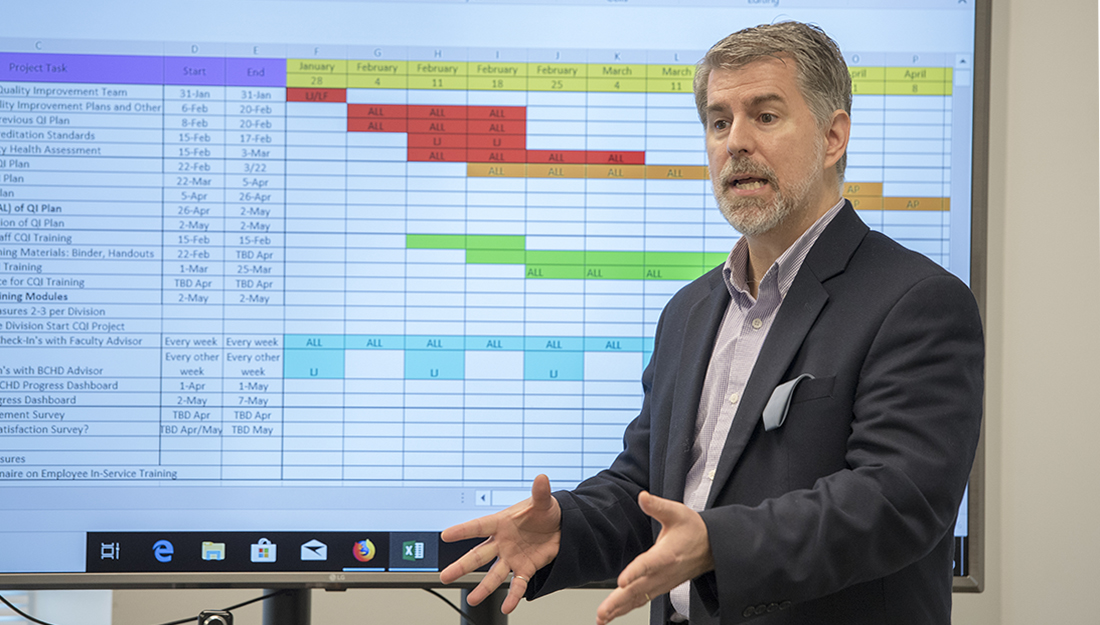- Tim Schnettler
- Community, Community Impact, Public Health, Show on VR homepage
Public health students address real-world challenges in the Brazos Valley
Jeffrey J. Hatala’s capstone class works to address transportation issues for vulnerable populations lacking access to health care

When Jeffrey J. Hatala, PhD, joined the faculty at the Texas A&M University School of Public Health, he inherited the reins of the capstone project in the Department of Health Policy and Management.
To Hatala, the program felt like it was missing something—something related to transitioning from school to careers. For him, that meant adding an experiential component.
So Hatala, who was serving as practicum coordinator for the Master of Public Health (MPH) program in the department, began contacting practicum preceptors to ask them, first, if they were pleased with the practicum student experience, and second—and more importantly—what projects they had in the works, or were thinking about, that the capstone students could be part of.
The practicum is a field placement where students work in an organization for a minimum of 200 hours to apply skills and techniques obtained through select coursework and create products that help the organization meet defined objectives. The capstone, on the other hand, is the culminating experience for students where they apply knowledge and skills gained from coursework and other experiences.
“I am so committed to that idea of students getting practical experience, and so wedded to that,” said Hatala who is an instructional associate professor and MPH program director in the department. “It is my passion, and it is my drive. This is something you can’t create in the classroom and there is no substitute for that.”
Hatala also took it upon himself to get more involved in the Bryan-College Station community, and if there was a coalition meeting in town, you were very likely to see him among those in the crowd. He would listen and look for project opportunities where students could engage in activities aligned with the health policy and management concentration.
“I just tried to attend as many different things as I could,” he said.
Addressing a need
Hatala initially spoke with the United Way of the Brazos Valley, which fights for the health, education and financial stability of people in the Brazos Valley, and serves citizens in Brazos, Burleson, Grimes, Leon, Madison, Robertson and Washington counties.
During these conversations, Hatala learned that one of the biggest issues was transportation and the need for a program to serve vulnerable populations lacking access to health care.
In talking to stakeholders and reviewing the Brazos Valley community health needs assessment, Hatala learned that the transportation issues presented obstacles for certain populations and led to individuals being late for appointments, or just not showing up at all.
Hatala felt this would be a perfect opportunity for his capstone students to try to find a way to overcome the barriers low-income populations face. It would also be the first step in giving students additional real-world experience.
“We always talk about real-world experience and giving students that and getting them ready to go out into the real world,” Hatala said. “Our students realize this is not just for a grade, it is impacting people even after they are gone. This is their future, and it starts now.”
Capstone students have worked over the last four years to develop what is being called Ride2Health, a program that involves volunteers recruited to serve as drivers to shuttle residents to health care appointments and pharmacies.
The Ride2Health program was selected to receive a $25,000 grant from State Farm, which selected 200 of the applications received to go through a 10-day online voting contest. The United Way of the Brazos Valley was one of 40 programs to receive funding. It was the only finalist from the Brazos Valley, and one of only 15 organizations in Texas to be selected.
The funds will be used to launch a pilot program with local partner organizations, the Brazos Valley Council on Alcohol and Substance Abuse, Health for All and HealthPoint.
“I give the United Way a lot of credit for getting this grant,” Hatala said. “I was poking around this summer looking for grants, saw this and thought it would be a good fit. I mentioned it to Peggi Goss, the vice president of community impact at the United Way of the Brazos Valley, and she submitted it.”
Building on his own experiences
Hatala’s desire to help his students be more prepared for their futures stems from his own experiences as a student.
“I was a dismal failure as a student because I believed I just needed to get good grades,” Hatala said. “Once I started working, I felt like I had done it all wrong.”
Hatala felt that his focus during his academic career should have been more on learning, and not just on his grades, saying he felt he cheated himself. He also said this led to him feeling unprepared when he found himself in the 40-hour workweek.
It is something he is determined to not let happen to his students.
“Projects are so conceptual, and I want them to roll up their sleeves and get in with me ankle deep,” Hatala said. “I want them to trust that it is going to be a ride and it is going to be okay. Being able to be flexible and adaptable is such a great thing.”
Media contact: media@tamu.edu


